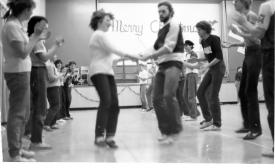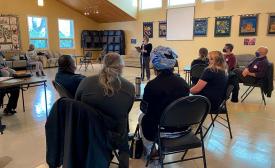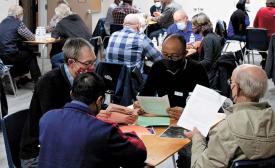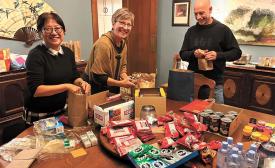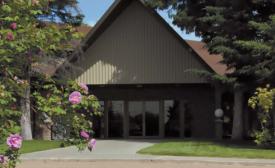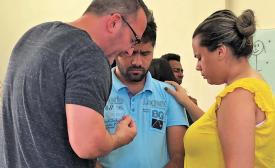Volume 26, Number 1
Telling your stories
As we launch into 2022, it’s helpful to reflect on the year that has passed. It’s also a time to consider what’s ahead.
With a presence both in print and online, Canadian Mennonite reaches readers within the Mennonite Church Canada family and readers who observe us from outside. I spent time looking at the 2021 content that resonated for both sets of readers.
Let’s talk about power
Did you know, there are over 650 occurrences of the word “power” in the Bible? Dunamis, a Greek word for power, occurs 120 times in the New Testament and means “strength” or “ability.” It is used to describe, for example, the power of God (Matthew 22:29), the power of Elijah (Luke 1:17), and the power of evil spirits (I Corinthians 15:24).
Readers write: January 10, 2022 issue
Thanks offered for ‘defunding police’ feature
Re: “Defund the police?” feature, Sept. 27, 2021, page 4.
Perpetual epiphany
It was a lifelong dream coming true. In a crowded stairwell I inched toward what we had all come to see. Down in the basement, below street level, the room smelled of the smoke from oil lamps dangling precariously overhead, the very place, according to tradition, where Jesus Christ was born. I was in the Grotto of the Nativity in Bethlehem.
Dancing problems
Problems with dancing have been discussed at numerous times in many church settings. On July 3, 1951, the Northwest Mennonite Conference delegates discussed the Alberta education system that offered lessons in various types of dancing. Delegates approved a resolution that read: “Such teaching encourages the sensuality of our age.
Dismay or hope?
As we move into 2022, many of us look back at our experience of church last year with dismay and we look forward with hope. Or do you look back with longing, and forward with dismay? Might we look both back and forward with hope?
She’ll be coming ’round the mountain when she comes
I’ve never seen mist move in so quickly. A multitude of mysterious wisps just appeared out of nowhere, advancing swiftly across the rolling hills before me like an army of ghosts. It was stunning, haunting, beautiful.
A survivor of sexual abuse speaks out
Yet again, I read last month about another pastor, an Anabaptist leader at that, being accused of sexual misconduct. It was Bruxy Cavey, pastor of The Meeting House, a Be in Christ megachurch. I thought to myself: “yet again.”
MDS responds to flooding in Princeton, B.C.

Alvin Klassen, Keith Rudance and Joy Dougans take a load to the dump in Princeton. Read about the efforts of Mennonite Disaster Service to help clean up the town in December, a month after severe flooding and mudslides wreaked havoc in British Columbia. (Photo by John Longhurst)

As part of the clean-up in Princeton, B.C., Mennonite Disaster Service volunteer Alvin Klassen emerges from a basement with a damaged chair.(Photo by John Longhurst)
“The Mennonites are coming!”
That was the buzz around the town of Princeton, B.C., in early December 2021, when the first 16 Mennonite Disaster Service (MDS) volunteers arrived to help residents hard hit by flooding in mid-November.
People in the town are “so exhausted,” said Spencer Coyne, Princeton’s mayor. But knowing help was arriving put “a glimmer of hope in their eyes.”
Baptism in a barrel
It is very difficult to go to the northern part of Ethiopia after the war broke out. Despite the security concerns, when I heard that members of our church in western Tigray were in difficult conditions, I organized a team. We would go there to show our love for Meserete Kristos Church (MKC) members in the area.
‘Courageous Imagination’
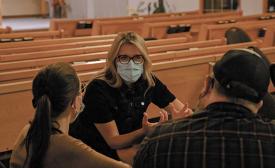
Cathrin van Sintern-Dick, MC Eastern Canada’s regional minister, centre, talks with Faith Glover, left, and Rielly McLaren at at Faith Mennonite Church in Leamington, Ont., at one of eight regional ‘Courageous Imagination’ gatherings last fall. (Photo by Yeabsra Agonfer)
It is “progress report” time, partway through Mennonite Church Eastern Canada’s year-long discernment process.
“Courageous Imagination: A journey together listening for God” was initiated last spring by the executive council of the regional church, noting that the last strategic plan was developed in 2014, and the current vision and mission statement was written in 2005.
Exhibit explores the meaning of head coverings
The vast majority of North American Mennonite and Muslim women do not wear any sort of veil or head covering. Why then do head coverings receive so much public attention? Do Muslim head coverings and Mennonite bonnets provoke the same response?
Menno Office offers tangible support through care packages
University of Manitoba students who gather online for peer support, topical discussion and spiritual guidance in the E-Menno Office had an unexpected surprise during the fall term.
Churches leave a legacy
In 2020, three Mennonite Church Saskatchewan congregations—Zoar Mennonite Church, Waldheim; Hanley Mennonite Church; and
Young adults are leaving the church but not Jesus
Depictions of God have always informed the faith of Christian believers.
This is your family
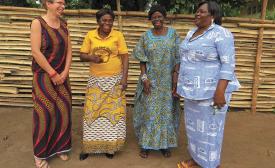
Tany Warkentin, left, is pictured with Adolphine, Marie and Hélène José, supervisors of the literacy program run by the Mennonite churches in the Democratic Republic of the Congo. Literacy teachers are trained and provided with basic teaching supplies, and they then offer classes in their own village to women and children who haven’t had opportunities to attend school. (Photo by Lynda Hollinger-Janzen)

Laurent, left, is a part of a youth association in the Democratic Republic of the Congo, created by a group of 10 incredibly motivated young people looking for work in a country with high unemployment rates. Each member contributes 25,000 francs ($12) at the end of each month, and then they take turns receiving 90 percent of the money for personal agricultural projects. The group uses the remaining 10 percent to collectively plant, harvest and sell peanuts, with the profit being added to the collective fund. As this fund grows, the youth association will invest in larger and more long-term agricultural projects. (Photo by Tany Warkentin)

The Grade 4 students at the Mennonite school in Bobo-Dioulasso, Burkina Faso, send their enthusiastic greetings. (Photo by Tany Warkentin)
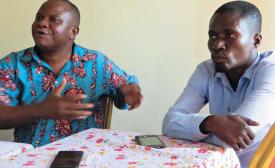
Pastor Ambeké, left, prepares to help Daniel take his place as the general secretary of one of the Mennonite conferences in Angola. This is the first time this conference will have had a peaceful leadership transition since it began in 1983. Ambeké said, ‘Some of our young people have grown up thinking that the only way to change leaders is through tension and force. Usually, new leaders are selected from senior leaders who are not leading good lives. But this time, the church has called this “Little David” because he has the right character. He is humble and he is the one we want, even if he is young.” (Photo by Tany Warkentin)
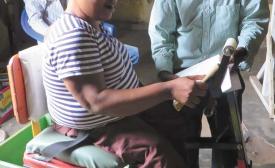
This young woman learned to read in one of the Congolese literacy centres, and she is reading the Bible in her own language. Despite her physical disability, learning to read and write has boosted her self-confidence and opened new job opportunities. (Photo by Tany Warkentin)
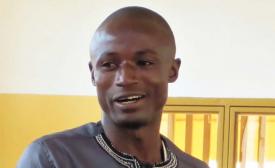
Josué, standing, is a young electrician called by the Mennonite church in Burkina Faso to start a hardware store in the village of Mahon. Many business owners in Burkina Faso have set up hardware stores or bookstores in villages where there are no churches. Through their positive Christian witness, neighbours have come to know Christ and churches were planted. This is the prayer and hope of the Burkina Faso church for Josué’s store in Mahon. (Photo by Tany Warkentin)
Have you ever been introduced to a distant relative for the first time—maybe you didn’t even know that person existed—and yet you immediately felt a connection with them? After all, they are family!





